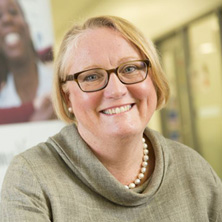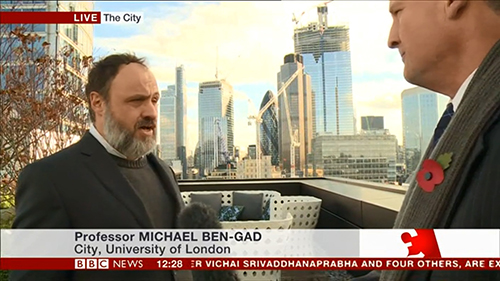Autumn Budget 2018: City academics react
Academics from across City, University of London have provided analysis of the 2018 Autumn Budget announced on Monday 29th October by Philip Hammond, Chancellor of the Exchequer.
Students on the Financial Journalism MA also provided coverage via The City Post, a multimedia and print supplement.

Investment in Social Care
Professor of Nursing: Care for Older People in the School of Health Sciences, Julienne Meyer CBE, said that she finds the budget measures for social care inadequate, a repetition of the past, and not a long-term funding solution.
“Austerity over? I don’t think so, not if you are working in social care. Time and time again, social care is treated with contempt, left alone to care for some of the most vulnerable citizens in society, unsupported, unfunded and ignored.
"£650 million for adult social care? The King’s Fund analysis of budget reveals £410 million is to be shared with children’s services, with only £240 million ring-fenced for adults. Once again, not enough – needs a long-term funding solution, not a papering over of the cracks for a failing system. Déjà vu comes to mind.”
Ageing population will cause debt 'crisis'
Professor Michael Ben-Gad, of the Department of Economics, offered his analysis of the economic landscape facing the Chancellor in an interview with BBC News.
He said the UK had recovered from some of the serious economic issues caused by the 2008 global recession, but that problems were likely to appear in the coming decades because of the UK’s ageing population and the strain that would put on public finances.
Professor Ben-Gad said: “The short-term problems have pretty much passed. The UK was very close to a sovereign debt crisis about ten years ago. Even with Brexit, that’s not going to happen – interest rates are low, the Chancellor can borrow as much as he’d like right now.
“The problem is the long run. In about eight years’ time, even with all the cuts that have been implemented, simply because of demographic change – the ageing of the population – the debt first of all will stabilise over next almost a decade, but then it starts to rise exponentially, very, very quickly.”
Professor Ben-Gad said he believed Philip Hammond was aware of these issues and would not radically increase public spending, even if another budget announcement was necessary in the event of a no-deal Brexit.
“One would hope that, at a time when there is no recession, at a time when it is still possible to lower the debt burden in anticipation of the crisis that is brewing in the future, he would be responsible and take this into account,” said the City economist.
“I think overall, compared to a lot of other politicians, he is quite concerned about these things and I don’t think there’s going to be a massive spending splurge.”
In relation to spending on the National Health Service, Professor Ben-Gad said more money was needed to improve services. He said reform was also needed in the pension system, with tax rises a potential solution.
“Theresa May already added about £20bn – that’s not immediate, but by the end of Parliament – to the healthcare budget,” he said. “That’s not going to improve service very much. That’s essentially just accommodating the demographic change that we’ve seen up until now.
“Beyond that, there are probably going to have to be very serious reforms to the way the UK pension system operates… in order to finance the growing burden that comes from shrinking a workforce as a share of the population and a growing number of elderly.”

Brexit 'exacerbates' problems
Professor Ben-Gad explained Brexit would cause short-term problems for the UK economy, but this would be equivalent to a minor “rounding error” in the country’s finances when compared with issues caused by the ongoing rise in public debt associated with an ageing population.
“I think Brexit exacerbates a lot of these problems in the short term. We think that the UK economy is probably 2 per cent overall smaller than it otherwise would have been because of the referendum. But, given the size of the problems, by 2046 the UK debt is projected to be essentially where Italy is now, and Italy is pretty much in crisis, and by 2052 it’s about to reach Greek levels of debt.
“That’s a crisis that’s coming. It’s coming at the end of the next decade, or at least it starts then. And Brexit in those terms is essentially a rounding error.”
Despite this, Professor Ben-Gad said the Chancellor could afford to invest in things that would boost the UK economy in the short-term.
“There’s probably room for more spending in infrastructure,” he said, “because that could help the economy grow a little faster, which would again ameliorate some of these problems. But one would hope that we’re not going to see a retreat from the pledge to stabilise the debt at least some time in the middle of the next decade.”
The City economist suggested another budget was likely in the next six months, when considering the possibility of a no-deal Brexit, but that the Chancellor would probably resist large increases in public spending because of his awareness of issues that would affect the UK in the longer-term.
“It’s probably not going to be all that radical because,” he said. The academic added, however, that “the UK can go deeper into deficit in the short term without some sort of catastrophe”.
Digital tax and impact of Brexit
Professor Anastasia Nesvetailova, of the Department of International Politics at City, said she believed the UK economy would be negatively affected by Brexit and that the Chancellor’s efforts to help the country grow would be undone by the damage caused by leaving the European Union.
“It does not matter in the slightest,” she said. “Whatever he promises will in real life be defined by forces he cannot control – namely Brexit, other political risks and the economic reality of being an isolated country.”
In relation to the announced digital tax on tech giants, Professor Nesvetailova suggested such a policy would be difficult to enforce effectively because of the way that companies like Google divide themselves up into smaller entities in different countries.
“Taxing big multinationals sounds great, but which of the thousands of Googles out there is he aiming to tax?" she said.
Good roads and a healthy environment
Royal Academy of Engineering Enterprise Fellow and Professor of Energy Systems in the School of Mathematics, Computer Science & Engineering, Professor Keith Pullen, welcomes the Chancellor's announcement of an investment of £30bn in the UK's transport network, with £28.8bn from vehicle excise duty ring-fenced for spending on roads.
 Professor Pullen is of the view that "whatever type of powertrain is adopted, sufficient roads of good quality are necessary". He added that potholes are "particularly bad for the greenest form of transport". He hopes that new and upgraded roads will have specific provision for cyclists such as dedicated lanes.
Professor Pullen is of the view that "whatever type of powertrain is adopted, sufficient roads of good quality are necessary". He added that potholes are "particularly bad for the greenest form of transport". He hopes that new and upgraded roads will have specific provision for cyclists such as dedicated lanes.
That said, Professor Pullen thinks that roads and a healthy environment are not incompatible with each other:
"Congested roads create inefficiency for the existing stock of petrol- and diesel-powered cars and increases toxicity and carbon dioxide pollution per journey. Of course, electric vehicles and other forms of lower carbon transport such as rail need to be supported, but this has to be done in parallel with the provision of a good road transport infrastructure."
